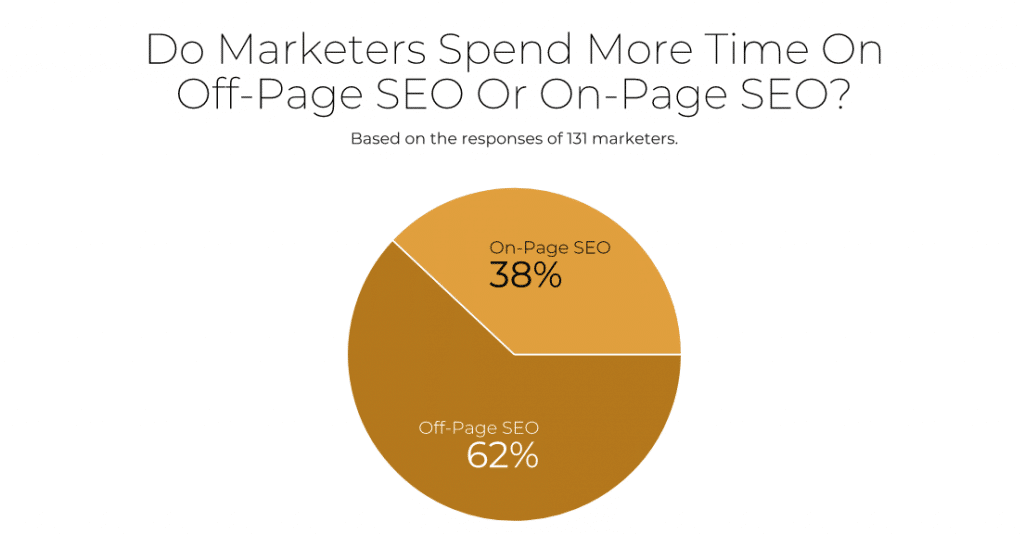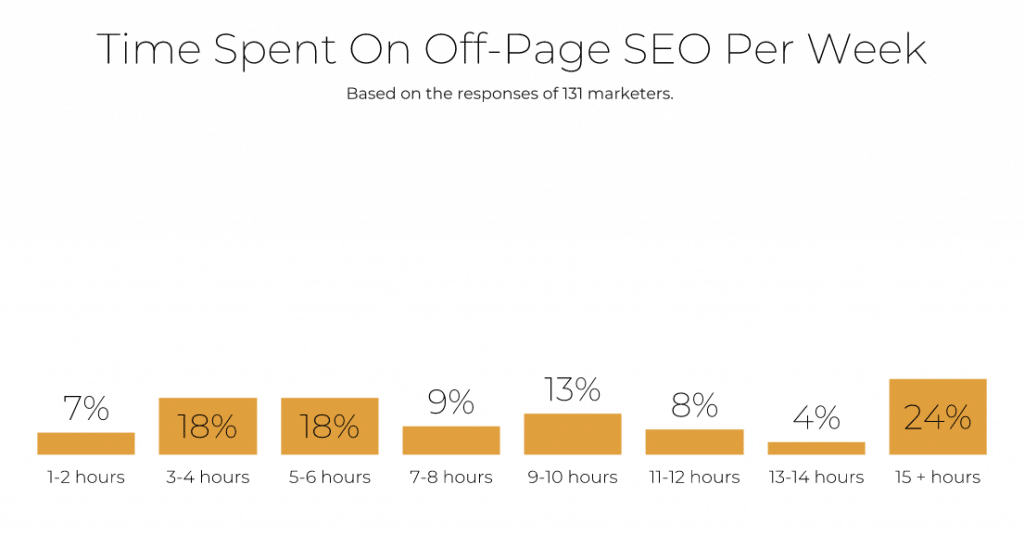On-page and off-page SEO go hand-in-hand in boosting your website’s authority and putting you on the path toward a coveted page one ranking. But when it comes to increasing those all-important page rankings, is on-page SEO or off-page SEO more effective?
Although it’s a difficult decision, we asked marketers to decide whether on-page or off-page SEO is more effective in increasing page rankings. Hopefully, their insights can help you make a more informed decision about how to divide your time.
We ran a survey to find out where marketers stand, and a whopping 131 marketers shared their insights. We’ll dive into their opinions later in the article. But first, let’s check out how much time marketers devote to on-page SEO vs. off-page SEO.
Time marketers spend on each type of SEO
When we asked marketers whether they spend more time on on-page SEO or off-page SEO, off-page SEO was the clear winner.
While 62% of the marketers we surveyed devote more time to off-page SEO, only 38% devote more time to on-page SEO. This indicates more marketers believe off-page SEO is more effective to increase page rankings.
But exactly how much time do marketers spend on off-page SEO? Interestingly, 24% spend 15 or more hours on the strategy per week –making this the most common amount of time spent.
However, when comparing marketers who spend 8 or fewer hours on off-page SEO vs. marketers who spend more than 8 hours on the strategy, there’s an almost even split. About 52% spend 8 or fewer hours on off-page SEO per week, and another 49% spend over 8 hours on off-page SEO.
Below is the full breakdown of how much time marketers spend on off-page SEO per week.
Is on-page SEO or off-page SEO more effective in increasing page rankings?
Now, let’s get to the meat – do marketers think on-page SEO or off-page SEO works better for increasing page rankings?
Many marketers told us outright that they had trouble making a decision, as the two SEO types work so closely in tandem (a trend you’ll see in several of the responses below). And some told us both on-page and off-page SEO are equally effective.
But among those who took a clear side, more marketers told us that off-page SEO is the most effective.
Let’s examine where marketers stand on this debate between on-page and off-page SEO:
On-page SEO is more effective, because…
The reasons marketers gave for choosing on-page SEOas most effective included:
- You need quality content to rank highly, regardless of how many backlinks you have
- You also need this quality content to acquire backlinks first
- On-page SEO is easier to configure
- You can control a lot of factors with on-page SEO
- Optimized content provides permanent value
Let’s dig into the details behind these reasons.
If you don’t have the foundations of on-page SEO, it doesn’t matter how many backlinks you acquire
“While you need both to maximize your impact, on-page SEO should be the foundation of your efforts. Off-page is the promotional part, which is important, too. But those off-page activities are not worth much, unless your on-page is compelling in the first place. By creating quality content on your website and optimizing it, you attract links, mentions, and shares organically.” –Johannes Rastas, Supermetrics
“I am convinced it’s worth starting with on-page. No matter how many links from high-ranked websites you have, if your website is not optimized for loading speed and UX flows, and if the USP is not clear for a user, you will not receive the expected results, regardless of your marketing budget.” –Bryce Welker
“I think the effectiveness of off-page SEO reaches a stopping point quite soon if it’s not also accompanied by on-page SEO. If you’ve ever had to migrate a website, you know firsthand that no amount of backlinks and digital PR can resolve traffic losses caused by fundamental misconfigurations in your site – whether those affect redirects, cause duplicate content, or leave your site uncrawlable.
“If you include reducing site speed, avoiding cumulative layout shifts, and focusing on the quality of your owned content, you are far more likely to see a positive impact on your rankings than if you were to solely focus on building links.” –Eleanor Bennett, Logit.io
“Good on-page SEO is the foundation. It ensures you have good off-page SEO. If you are creating high-quality content that is in-depth and well researched, it will earn you links, but not without a little help. As the saying goes, ‘Content is king, distribution is queen.’
“You still need to try and get your content out there via an omnichannel approach. Publish it and share it via social media platforms, and don’t be afraid to do a bit of outreach to let people know about the great content you have.” –Tonya Van Ry, Utah SEO Companies
“In regard to page rankings, I would say on-page SEO efforts are more effective. Without having a quality landing page that’s optimized without keyword stuffing, structured for best user experience, and answering user intent, the page has a low chance of ranking on the first SERP – even with proper brand awareness.” –Carey Shook, B.O.G Pest Control
You need quality, optimized content for backlinks in the first place
“Practicing excellent on-page SEO must be the first priority. The reason? It’s simple: In order to earn quality backlinks and enhance your online presence, your website must have unique, exceptional content that’s worthy of ranking on the first page of search results. Top-notch content will be far more likely to earn backlinks, social shares, and additional forms of online exposure that’ll enhance your off-page SEO.” –Michelle Alese, Kantaloupe
“On-page SEO is key. A person could spend very little time on off-page SEO and still have a successful content strategy. Relevant and high-quality content will be found and linked to. Many of the backlinks I’ve gotten for my site came unprompted and without a prior relationship. But the content was well-researched and ranked for key search terms, even with a low domain authority.” –Sydney Myers, Dallas Hoops Cast
“If I had to select only one, it would be on-page SEO. You cannot get a truly effective backlink unless you have stellar, well-optimized content to begin with. If you can get a link with weak content, it’s generally not going to be a link worth having. It’s also not likely to rank well for the terms you are targeting.
“That said, unless your website as a whole is already a dominating authority site, you’re going to have an extremely difficult time getting anything you publish into the top spots without backlinks. Proper on-page SEO is essential, but off-page SEO will push your stellar, already well-optimized content to the very top of the rankings.” –Dave Hermansen, Store Coach
On-page SEO is easier to configure, and there’s a lot you can control with it
“On-page SEO is definitely more effective in increasing your page rankings. Search engines have hundreds of factors to rank websites and pages. Links directed to them are just one of those factors. With on-page SEO, you can work on your content, include keywords in the titles, H2, H3 tags, copy, image alt text, as well as internal linking. You can also improve your website speed and other technical SEO.
“Before working on off-page SEO, you want to make sure you have a strong, powerful on-page SEO strategy and infrastructure.” –Jonathan Aufray, Growth Hackers
“On-page SEO is more effective because you have more control over the likelihood of success. For example, I can spend time writing a guest blog post that may never be published, or the same amount of time writing a blog post for my own website fully optimized for SEO.” –Emily Carroll, Drive Research
Optimized content provides permanent value
“I think focusing on on-page SEO is the way to go. Marketing this way is inexpensive and doesn’t take that much time. After you optimize your content, the value you get out of it is permanent. Whereas with backlinks, things can be sketchy, especially if you use the wrong anchor text or get a backlink from a spammy or a low-quality site.” –Lukasz Zelezny
Off-page SEO is more effective, because…
Reasons marketers gave for choosing off-page SEOincluded:
- Off-page SEO is vital for reaching new audiences
- Off-page SEO quickly boosts the authority of new sites
- It’s a great way to build relationships with other sites
- Backlinks are necessary for boosting rankings, even when your content is high quality
- Off-page SEO provides direct ranking boosts and permanent value
- Fewer people know how to do it properly, so following off-page SEO best practices brings greater rewards
The need for backlinks was overwhelmingly the most popular reason for choosing off-page SEO. But let’s dive into all the reasons why marketers think off-page SEO works better to increase page rankings.
Off-page SEO helps you reach new audiences
“There is only so much you can do on your own website. In contrast, the possibilities to build website authority from off-page SEO is boundless. Off-page SEO is the new word-of-mouth strategy. It allows a website to build credibility in the eyes of Google, which increases your brand’s exposure and likeliness to be found by prospects.” –Kevin Van Dijk, Tree Online
“Off-page SEO is very successful for us because it presents our company in front of audiences that may never have learned about us otherwise. Additionally, the backlinks included in guest posts, HARO quotes, or roundup posts or surveys have shown a definite increase in our page rankings.” –Alexandra Zamolo, Beekeeper
Off-page SEO can quickly help new sites gain traction
“Off-page SEO is more effective in increasing your page rankings, especially when you’re first starting. It can take time for your target keywords to rank on Google’s first page. Off-page SEO helps build your authority, credit, and trustworthiness as an expert in your field. This can ultimately bring more people to your site than relying on-page SEO.” –Grant Aldrich, Online Degree
You can’t own organic results without the right relationships
“When it comes to increasing your page ranking, on-page SEO is not enough. It’s a must for every business owner to use ironclad off-page SEO strategies to own organic results. It’s all about building relationships, and adopting an off-site blogging strategy will do wonders on your road to a better SERP ranking.” –Israel Gaudette, Link Tracker Pro
No matter how optimized your content is, you need quality backlinks for real authority
“With the ever-changing world of Google algorithm updates, off-page SEO is more important than ever. While most SEOs tend to associate off-page SEO with backlink-building, what really matters is having backlinks from trusted, high-quality sources. And these don’t just happen with a mass-mailing campaign and polite requests for websites to add your links. Off-page SEO can’t be overlooked.” –Polly Vodenicharova, Homes for Students
“The ranking benefits of off-page SEO outweigh those of well-done on-page SEO. A good example of my lean toward off-page SEO as being more effective is high-quality links. These show authority and trust, both two important factors in Google’s algorithm that emphasizes the importance of expertise, authority, and trust (EAT).” –Jenny Abouobaia, SEO With Jenny
“You could have the most optimized pages in the world, but you’re not going to get anywhere without good backlinks. A link is a vote of confidence about a page or domain. A page wouldn’t have any links if it didn’t deserve them.
“If a page has a lot of high-quality links from other relevant pages, it must be a trusted resource Google can rely on to show early in search results. Not all links are equal, though, and Google is constantly cracking down on methods that get abused.” –Dan Reeves, Dandy Marketing
“Off-page SEO is more effective in improving your page rankings. You can optimize a website to the fullest extent possible (e.g., meta descriptions, alt tags), and so can all of your competitors. But the thing that will lead to the biggest difference between your page rankings and your competitors will be the number of quality backlinks your site receives.
“If your fully optimized competitor website has only 10 backlinks from quality sources, and your fully optimized site has upwards of 20 or more, you can guarantee your site will rank higher than your competitor.” –Niles Koenigsberg, Real FiG Advertising + Marketing
“On-page SEO is essentially a game of fine margins. We only have enough data about what Google wants to edge each other out, and it is a constant battle to get this edge. With off-page SEO, we can outdo each other in terms of quantity and quality of links by a near infinite margin, so it puts more daylight between us and our competition.” –Oli Graham, RightlyWritten
Off-page SEO provides more direct rankings boosts
“I have been working on both our on-page and off-page SEO, and have noticed our off-page work has had a much more noticeable direct effect on our SERPs. On-page SEO is definitely valuable and should not be ignored. It doesn’t have the same effects, though, as gaining new backlinks does. There are even some on-page SEO factors that are so low on the ranking factors list, the penalty for not doing them correctly is so minuscule you won’t be able to tell once they have been fixed.” –Ben Walker, Transcription Outsourcing
Off-page SEO gives more permanent rankings boosts
“On-page SEO is faster because you can literally include a new keyword on your page and as soon as Google re-crawls it, you get indexed in that keyword’s SERPs. However, on-page SEO is typically not enough to rank – and for that you need external signals. Off-page SEO gives you a permanent rankings boost and is more powerful.” –Nikola Roza
Despite taking more time, the results are invaluable
“I had the best results when I focused on off-page SEO. On-page SEO doesn’t require much time, just the right tools. As for off-page SEO, you need to sacrifice a lot of time, but it’s worth it. Guest posting, outreach, roundups, social media marketing; all of those things need time, but you get valid, good quality links out of it.
“I saw the biggest increase in organic traffic on my sites when I started to shift my eyes to off-page. I started using social media much more because it became so popular. This also brought me some nice results.” –Dmitry Suponau,Number For Live Person
“I think a mix of both is optimal. However if I were to choose one, it would have to be off-page SEO. On-page efforts can be highly automated and done for you with a few clicks. Off-page SEO, however, takes far more time (and money) to master.
“I focus on link building as a method of driving traffic to my site over any other technique, as I’ve found that even if your on-page SEO is perfect, you’re still not going to rank well for the keywords that matter.” –Thomas Kelly, Zero Effort Cash
Fewer people know how to do off-page SEO well, so doing it right brings more rewards
“Off-page SEO is more effective in boosting page rankings than on-page SEO. On-page SEO is relatively easier to implement, and almost everyone in our niche does it to some extent. So, it’s very difficult to gain any competitive advantage with on-page SEO.
“Off-page SEO, on the other hand, is more difficult to execute and many marketers do it the wrong way. Off-page SEO has definitely been more effective in outranking our competitors.” –Baidhurya Mani, Sell Courses Online
“When done correctly, off-page SEO has the power to completely change your business and set you apart from the competition. Anyone can build a website and SEO it appropriately, but it’s the little things that really start to snowball and give you that significant boost in page ranking and set you apart.” –James Watson, Omaha Homes For Cash
On-page and off-page SEO are equally effective
Some marketers couldn’t choose between on-page SEO and off-page SEO, and gave us detailed reasons why both are equally effective for increasing page rankings:
“On-page and off-page SEO are the two pillars holding your organic traffic performance. Your performance will fall and shatter if one of the two pillars is not strong enough. What makes them different is the on-page SEO work takes significantly less time and effort. With on-page SEO, everything is under your control, and if you know what you’re doing, the results will come quickly. For off-page SEO, you need to be creative to achieve high-quality backlinks without going in the black-hat direction and spending a fortune.” –Illia Termeno, CMO Consultant
“Both off-page and on-page SEO are crucial to improving your page rankings. It’s like building a house. On-page SEO is the foundation, while off-page SEO is the superstructure. No matter how excellent your off-page SEO efforts are, if your on-page SEO is shaky, your house will come tumbling down. But a magnificent foundation alone isn’t enough. Your pages must be visible on search engines.
“First, get technical and on-page SEO right. Once you’ve set the foundation, go all out on the superstructure: intentionally build links, write guest posts, create highly shareable content, and more. In no time, strangers will stop to admire your pages and better still, tell others about it.” –Qhubekani Nyathi, Wholesome Commerce
“Google has multiple algorithms that look for value in both types of SEO. Google looks for someone who understands the vastness of their subject matter (on-page SEO helps you rank for keywords and builds trust and authority). However, if you do this without any off-page SEO, you’ll never reach the top three search results. And if you have lots of off-page SEO, but no real SEO-forward content, Google will see this as poor quality. You’ll probably have weak UX and a high bounce rate.” –Andrew Kolodgie, The House Guys
“On-page SEO is more effective, but only because it’s much easier to influence. Many websites can make noticeable gains by implementing on-page SEO best practices. Most sites still have so much untapped opportunity. But if you don’t promote your content, you’ll still be the best-kept secret, with little traffic to show. Make sure that off-page SEO and promotion play a key role in your SEO strategy.” –Mark Reynolds, ProfitReach
“If your on-page SEO is poor, your off-page SEO isn’t likely to increase your page rankings. On the flip side, I think you need consistent off-page SEO (backlinks) to maintain rankings that were achieved by effective on-page SEO. Spend time analyzing your competitors in search rankings to see what they are doing well for both on-page SEO and off-page SEO. See what the top-ranking websites are doing and try to replicate their efforts.” –Matt Zajechowski, Digital Third Coast
The most effective SEO strategy depends on certain conditions
Still, other marketers told us the most effective SEO strategy depends on how competitive your niche is or how established your business is. Here’s what these marketers had to say:
It depends on the life stage of your company
“I believe off-page SEO is more important than on-page SEO to a certain point, due to the need for Google to validate that you are a legitimate entity. However, at a certain point, building backlinks has diminishing returns and a website owner must rely on their ability to generate unique and authentic content. Therefore, in the short-term (three to five years), off-page SEO is crucial for a growing brand. However, in the long-term, content is king as it always has been.” –William Chin, PickFu
“If a site has just launched or is about to launch, then on-page SEO is more important. This is because the site is ready for potential customers and the search engine robots. Pages will be indexed quickly, showing if the site is relevant and easy to navigate, and these factors will be shown in the rankings.
“But for continuous positive rankings, off-page SEO needs to be implemented into the overall SEO strategy. It becomes just as important as on-page SEO, and link building and outreach shouldn’t be overlooked.” –Mollie Earnshaw, Zeal
It depends on how competitive your niche is
“If there’s not a lot of competition, it can be easier to get into the top of the search results with great keywords, stellar content, and excellent user experience. If it’s a more competitive market, factors such as the domain authority and the popularity of the website become much more important.
“We like to combine both by getting everything up to scratch on-page first, then turning our focus toward off-page SEO, such as backlinking, guest blogging and PR.” –James Parnwell, TheOnlineCo.
“I think off-page SEO is more important for more competitive topics like finance or blogging because you need backlinks to rank no matter how optimized your content is. On the other hand, for very niche sites, you could get away with focusing only on on-page SEO. It really depends on your niche and how competitive things are.
“Off-page SEO is a huge ranking factor, which is why Forbes is going to rank higher than you even if you have a better article. So, both are ideal, but you can focus on off-page more if you have a more general website.” –Freya Kuka, Collecting Cents
“It depends on the SERP and competitive environment the domain is operating in. If you are in a highly competitive niche or keyword group, then the power of your brand/link profile is going to play a major role in your ability to rank quickly and competitively.
“However, if you are targeting a group of keywords where the ranked pages are either low quality (i.e. not answering the queries as well as they could) or the competing domains have low link equity metrics, then link building and off-page SEO doesn’t need to be a huge investment. It will still help, but like everything in SEO, you don’t compete in a silo.” –Darren Kingman, Root Digital
Wrapping things up
Although off-page SEO appears to be slightly more effective than on-page SEO, off-page SEO is also more time-consuming. And without the strong foundations of on-page SEO (creating quality content), your off-page SEO efforts, especially intentionally building backlinks, won’t gain much traction.
Make sure you balance your on-page and off-page SEO strategies, but expect to spend more time tightening your off-page SEO if you want to increase page rankings.
Looking for off-page SEO strategies, beyond the standard backlink building strategy? Wondering which off-page SEO strategies marketers find most effective? 131 marketers shared their insights here.
And in this expert roundup, 15 marketers go in-depth on their off-page SEO secrets to help you take even more control of your off-page SEO.





